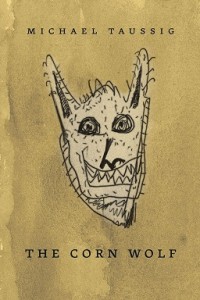“Anthropology’s Storyteller-Shaman-Sorcerer”

From a recent review of Michael Taussig’s The Corn Wolf at Pop Matters:
Taussig’s work is the sort of bewilderingly beautiful prose (one is often tempted to call it poetry) that’s able to operate on multiple intellectual levels. The first essay in the collection, “The Corn Wolf: Writing Apotropaic Texts”, immerses the reader fully and mercilessly in the style. It opens with a poor graduate student realizing that writing up their fieldwork is the most difficult and important task of graduate school, and also the one thing graduate school teaches you nothing about. Fieldwork and writing; “they are both rich, ripe, secret-society-type shenanigans. Could it be that both are based on impossible-to-define talents, intuitions, tricks, and fears?”
No wonder many careerist academics dislike him.
Of course the essay isn’t so much about graduate writing as about his own writing, and about the act of writing—the magical act of writing—itself.
For example, Taussig considers anthropology’s treatment of magic and shamanic sorcery: “Pulling the wool over one’s eyes is a simpler way of putting it… What we have generally done in anthropology is really pretty amazing in this regard, piggybacking on their magic and on their conjuring—their tricks—so as to come up with explanations that seem nonmagical and free of trickery.”
This seemingly nonmagical academic form of writing—or mode of production, as he calls it—is what he refers to as ‘agribusiness writing’: “Agribusiness writing is what we find throughout the university and everyone knows it when they don’t see it.” Against it he pitches the idea of ‘apotropaic writing’, a magic that connives with the prosaic to produce a counter-magic of its own.
When anthropologists demystify shamanic sorcery, for instance, the ‘wolfing’ moves of apotropaic magic would reveal the sorcery implicit in the act of the ‘scientific’ anthropologist’s recasting of shamanism. Indeed, the fact that the wonder and magic of the everyday world has been demystified by science is a sort of magical transformation itself. Is this how we re-enchant the world? By the use of story-telling and writing to re-position what seems like the boring, unmagical workaday world of everyday capitalist drudgery and expose it as the magical sleight-of-hand and tricksterism that it is? “I have long felt that agribusiness writing is more magical than magic ever could be and that what is required is to counter the purported realism of agribusiness writing with apotropaic writing as countermagic, apotropaic from the ancient Greek meaning the use of magic to protect one from harmful magic.”
To read more about The Corn Wolf, click here.
To read the Pop Matters review in full, click here.